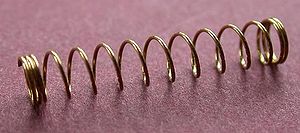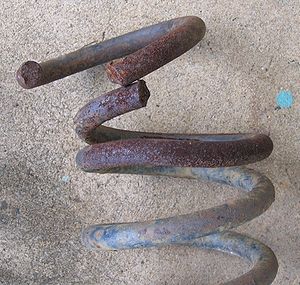Coil spring
A Coil spring, also known as a helical spring, is a mechanical device, which is typically used to store energy and subsequently release it, to absorb shock, or to maintain a force between contacting surfaces. They are made of an elastic material formed into the shape of a helix which returns to its natural length when unloaded.
Coil springs are a special type of torsion spring, the material of the spring acts in torsion when the spring is compressed or extended.
The two usual types of coil spring are:
- Tension coil springs which are designed to resist stretching. They usually have a hook or eye form at each end for attachement.
- Compression coil springs are designed to resist being compressed. A typical use for compression coil springs is in car suspension systems.
Metal coil springs are made by winding a wire around a shaped former - a cylinder is used to form cylindrical coil springs.
Many types of coil spring are wound in an annealed (soft) condition and then tempered to achieve their strength as a spring. Over time, this tempering can be lost and the spring will sag because it can no longer withstand the loads applied. Such springs can be re-set by annealing, returning to their original length (or deliberately setting them to a different length) and then re-tempering. Damage to springs, such as using oxy-acetylene to cut the end off a car suspension spring to lower a vehicle's ride height, can destroy the tempering in localised areas of the spring.



